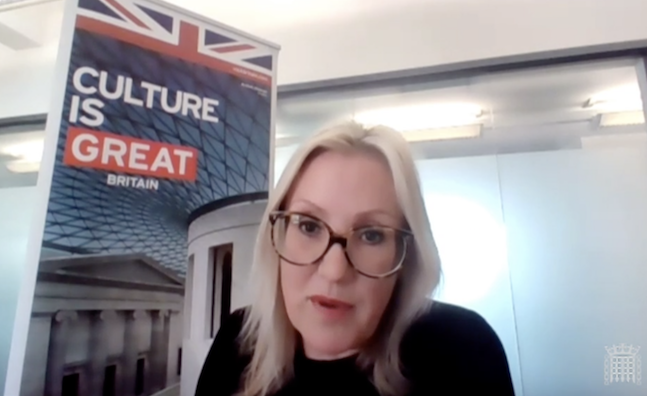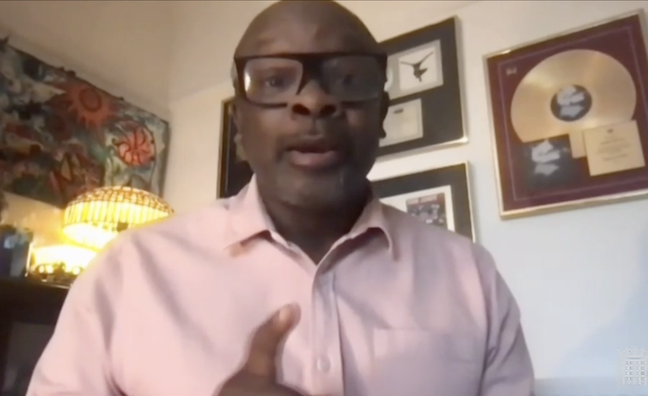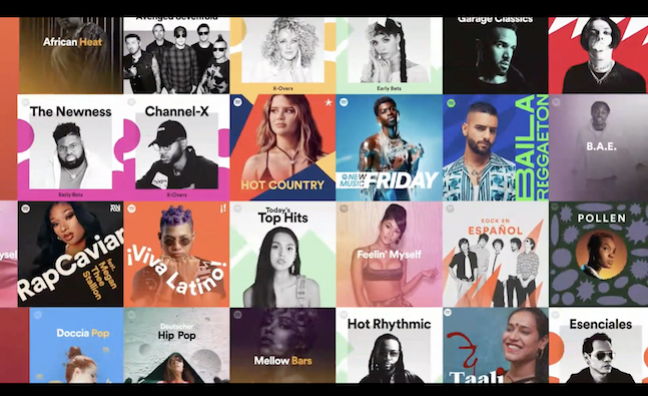When committee chair Julian Knight MP called “order, order” after the final session of the streaming inquiry, it marked the conclusion of four months of high-stakes debate that could influence the future of the music industry.
There have been dozens of evidence submissions and hours of hearings (Music Week has covered them all) to try and get to the heart of the economics of streaming.
Early on in the DCMS Committee inquiry, MPs – understandably – seemed to be getting their heads around the streaming business model and, as the weeks progressed, some parliamentarians played to the gallery.
Despite the discomfort for some witnesses under relentless questioning and the occasional evasive answer, it’s largely been an illuminating and rare insight into the modern streaming economy from senior executives who we don’t often hear from and MPs who asked important questions. Among artists, Nadine Shah made headlines with her memorable intervention about the impact of streaming on her personal finances.
The final session featured Caroline Dinenage, Minister for Digital and Creative Industries from DCMS, and self-confessed Northern Soul fan Amanda Solloway, Minister for Science, Research and Innovation at the Department for Business, Energy and Industrial Strategy. Here, we look at how the inquiry could potentially impact the music industry…

Government
In the final session, Caroline Dinenage welcome the inquiry by suggesting that the economics of streaming had largely been “opaque” until now.
“The pandemic has highlighted more than anything how much modern artists rely upon live performances now, in the way that they very much used to rely upon the sale of CDs,” she said.
“Streaming has enabled more artists to become successful but at the same time more unsuccessful,” added Dinenage, acknowledging the gap that’s opened up between different types of acts.
Dinenage noted the “very varied views” across the music sector about how remuneration is shared among artists. She even highlighted AJ Tracey as a self-releasing success story and noted that Stormzy hadn’t needed a major label to break through (although his distributor was Warner’s ADA).
“We know that there are some really successful artists who are effectively their own record company,” said Dinenage.
The minister had been well briefed and was clearly engaged in the debate, though her answers will probably please the BPI more than the #BrokenRecord campaign. While noting that it’s “very difficult” for some artists, she highlighted how streaming works well for certain kinds of music.
“There are certain genres of music that really lend themselves to streaming, so the sort of stuff that my kids love – R&B, rap, bedroom pop – for all those types of music, streaming is crazy,” she told MPs. “Top artists, the likes of Dua Lipa and Ed Sheeran, are doing billions and billions of streams. There are certain genres of music, like folk and classical music, where there are less [streams], and therefore it's much, much harder for those artists.
“Someone like Nadine Shah, who is a brilliant, brilliant artist, she has a quite a small but a very loyal following, so she does really well in the live performance market, but less well in streaming. And that's the difficulty, it very much depends on the genre and you have to break that out of the wider sense of unfairness that some artists are feeling.”
Solloway stressed that “streaming has opened the door for artists of all sizes”, but said that label contracts were outside of her department’s control. She also noted that the return of live was crucial for artists, though admitted that was “not helpful” for the MPs’ inquiry.
Asked about YouTube and the safe harbour provisions that concern the music industry, Dinenage mentioned the powers of the Competition & Markets Authority. The CMA became a recurring theme for the minister when faced with any concerns by MPs about the inner workings of major labels and transparency.
“I would just love to see the music sector more broadly coming around the table and working out what they think is fair, rather than [people] expecting there to be some sort of government decision or government mandate on this,” she said.
Questions about whether streaming is equivalent to a purchase, rental or broadcast right were largely avoided, with officials stepping in to identify the “making available right” as being designed for the digital era. While MPs have looked at how on-demand streaming might be different to programmatic music on DSPs, execs have noted that playlists are often based on users’ preferences.
While there was clearly interest in the MPs’ inquiry, there was no sign that government is looking to make any changes. But the report could yet influence their thinking, while key players in the streaming system could implement their own reforms…
Major labels
The three major labels faced the toughest questioning (with the exception of YouTube) of the inquiry, with committee chair Julian Knight even making unfavourable references in later sessions. Yet they were always going to be on the defensive, especially coming after the sessions featuring artists and songwriters. Over the course of the labels’ session, they also managed to make their arguments about the investment in artists and correct some false impressions, such as the claim that modern contracts in the streaming era routinely featured clauses on deductions for breakages from physical music shipments.
Like an incumbent government facing an election, the labels were largely arguing for no change to the system, with the promise of greater tax receipts and export opportunities if the streaming market was allowed to grow without regulation. However, indie giant Beggars Group urged the majors to increase their royalty rates, so the inquiry and the final report will likely put upwards pressure on that rate in any future negotiations.
Streaming very much depends on the genre and you have to break that out of the wider sense of unfairness that some artists are feeling
Caroline Dinenage
Labels are not about to break with the current system of their own direct deals with DSPs behind closed doors. So the most immediate change is likely to be greater efforts by the majors to demonstrate how streaming has helped artists reach new audiences globally and the industry return to growth. The upcoming BRIT Awards is one opportunity to get that message across to an ITV audience and beyond, while the current run of 10 No.1 albums each with a majority physical sale shows there’s a positive story for physical music in the streaming era. During the inquiry, the BPI admitted to paying a lobbying firm, along with other trade bodies. Their efforts to win hearts and minds won’t stop now the inquiry is over.
Streaming platforms
Alongside this inquiry, Spotify has already unveiled a new website, Loud & Clear, to increase transparency for songwriters and artists globally. We can probably expect more of that sort of thing to counteract some of the negative coverage. But DSPs made clear they do not directly pay artists, which is down to labels, and there is no single royalty rate.
MPs on the committee and execs giving evidence also raised questions about the free Spotify service (“If the ad-funded model went tomorrow, I’d be delighted,” said Sony Music UK’s Jason Iley), and how it’s potentially reducing the perceived value of music (as well as widening the DSP losses) as it’s been used to build market share. Yet there’s been no sign of Spotify withdrawing from the ad-funded services in an aggressive marketplace, especially as it’s competing with free platforms such as YouTube.
The inquiry has, perhaps, given Spotify an opportunity to press ahead with a price increase to £10.99 a month in the UK, which the industry has seen as long overdue. The streaming giant (which has already been testing customer reaction to the move) and rivals could portray price rises as an artist-friendly move, as the static price point was a concern for several witnesses during the inquiry.

Artists
MMF’s vice-chair Kwame Kwaten appeared during the inquiry to give the perspective of artists and their teams. Ahead of the final session, CEO Annabella Coldrick wrote for Music Week about the changes the trade body would like to see.
Two big changes that have come up during the sessions are a user-centric payment system and equitable remuneration, which would create an even revenue split between labels and performers (like radio).
If anything, user-centric has become less appealing during the hearings with its complexity being highlighted, as well as questions over how much of a royalty redistribution would actually be achieved. Organisations such as AIM have come out against the change, although SoundCloud’s move to implement a partial user-centric system put it back on the industry agenda.
In the final session, Musicians’ Union and PRS member Kevin Brennan MP argued for the merits of equitable remuneration by highlighting Spotify’s ambitions to replace radio and the secondary rights that broadcasting historically provided to performers. Tim Moss, chief executive of the Intellectual Property Office, suggested the current system was “fit for purpose” despite concerns raised by Brennan about artist’s rights being eroded. After a heated discussion about IPO research, Knight stepped in to call for clarity from Moss.
In an earlier hearing, Damian Green quizzed Spotify’s Horacio Gutierrez about the impact of equitable remuneration where it exists in Spain.
“It has not really affected the way that we operate in Spain, but it has made it harder for us to have a path to profitability and margin expansion,” he said.
Green revisited the Spanish system in the final session and Moss said it was being looked at in more detail, although he suggested it involved more complexity. But it’s on record in a parliamentary inquiry that a major streaming service is able to operate equitable remuneration in Europe.
Songwriters and publishers
Is there a row brewing between songwriters and publishers on streaming royalty rates?
Publishers currently collect around 15% of streaming revenue compared to 55% for labels (DSPs retain around 30%). During an earlier hearing, MPA chair Roberto Neri underlined the progress that had been made from under 10% after successful negotiations within a free market system.
“We’re very convinced that we’re moving in the right direction,” he said. “I’m very glad to say that songwriters are at the table when we’re discussing our negotiations… Could we do more, would we like more? Of course, yes, but we are moving in the right direction.”
Ivors Academy CEO Graham Davies suggested that songwriters are being overlooked and that a cut of 15% is not good enough. The trade body has called for government regulation.
“It seems to be the job of the creators to speak freely on this matter and that’s what we’re doing,” he said.
Reaction
Trade bodies have since reacted to the final hearing ahead of the report from the DCMS Committee.
MMF CEO Annabella Coldrick expressed her hope that the committee will “come forward with some strong reformist recommendations on how streaming can function more equitably for music makers”.
“In today's wrap-up evidence session it was also heartening that the Culture Minister appeared to acknowledge the need for further investigation into the functioning of the recorded music market, potentially with involvement from the Competition & Markets Authority and a full review of UK copyright law learning from the implementation of the new directive in the EU,” she said.
We are particularly pleased the minister sees the value of bringing the industry together
Annabella Coldrick
“We are particularly pleased the minister sees the value of bringing the industry together, and we hope she would want to be part of any future roundtable discussions to ensure the tough issues are addressed in the digital music market. We will undoubtedly need that continued engagement from government in order to deliver much-needed change.”
Naomi Pohl, deputy general secretary of the Musicians’ Union, said: “Given the evidence they have heard during this inquiry, we are extremely hopeful that the MPs on the Select Committee will make a case for improving music streaming economics for musicians and songwriters. Caroline Dinenage has helpfully highlighted the similarities between aspects of music streaming and radio, which reinforces our plea for it to attract a similar division of royalties between label and artist as we see for radio play. With just a small tweak to UK copyright law, we could introduce a guaranteed payment to all musicians whether featured or non-featured, recouped or unrecouped. We hope the IPO will engage with us going forward to look at how this could be achieved and what a positive impact this could have on performers' livelihoods.”
Graham Davies, CEO of The Ivors Academy, said: “The UK leads the world with the quality of our songwriters, composers and artists, but outdated industry structures suppress their incomes. The inquiry has shown that there is strong support for reform to keep the dominant multinational labels in check, provide transparency where there is little and provide our musicians with sustainable incomes. We welcome the Culture Minister’s support for a referral to the Competition and Markets Authority, and the Committee’s interest in creating an equitable, fair and transparent streaming economy.”
Click here for all of Music Week’s coverage of the streaming inquiry.










